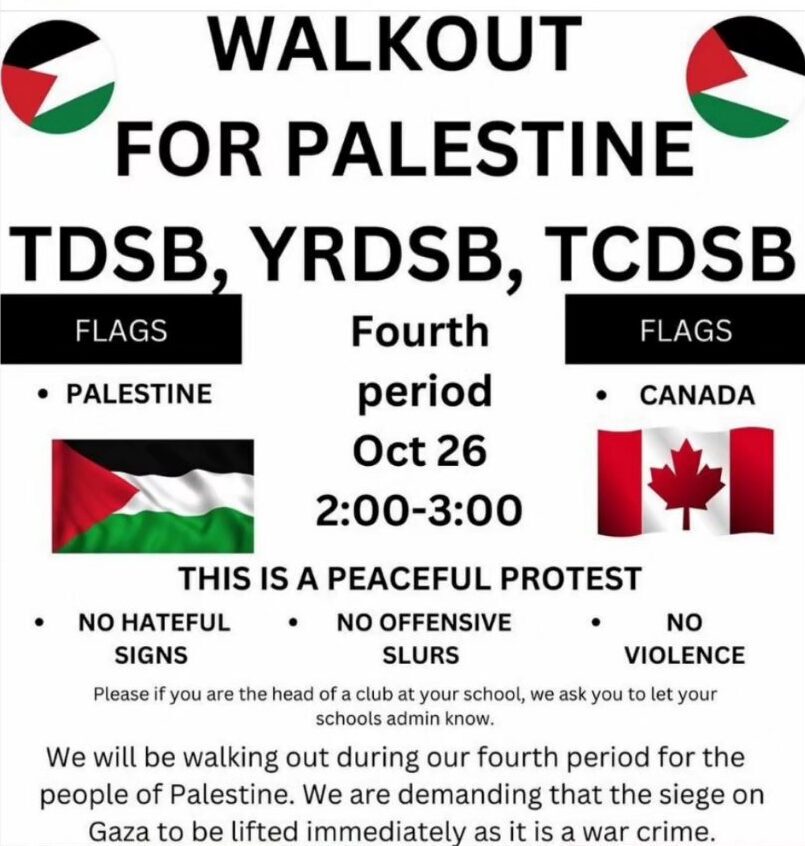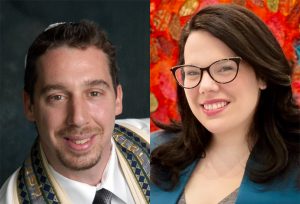Jewish students attending public high schools, particularly in Toronto and York Region, say rising anti-Israel sentiment among their peers is leaving them frustrated, and sometimes scared.
A Grade 9 boy witnessed a Nazi salute at his downtown Toronto school. A Grade 11 girl found herself avoiding parts of her east end neighbourhood where a former (middle school) classmate made violent threats in private messages about the situation in Israel. Swastika graffiti appeared in a boys’ bathroom at a Toronto District School Board (TDSB) high school in the north end of Toronto.
While several students interviewed say they feel unsafe, in school or online, some teenage boys report they don’t feel threatened at school, mainly because they think they don’t look like someone who’s easy to beat up; but they worry that younger Jewish kids might be bullied.
Some students who spoke with The CJN say they feel that their concerns have been ignored or dismissed by administrators and teachers, who they say avoid discussion of current events in Israel.
Worse, many students say, is that schools aren’t taking the lead on an important conversation, adding to the ways in which the palpable anti-Israel sentiment of the moment blurs more frequently into antisemitism.
Marisa T., a Grade 11 student who prefers to withhold her last name, attends high school in North York and criticized the school board’s non-committal response.
“Initially I had some patience. I was expecting them to take their time to come out with a statement, with resources and a game plan that was actually going to benefit the students. [We] have not quite seen that done yet… although they have made some statements, it’s been very general and unhelpful.”
Students have expressed that they don’t feel safe, especially on days when Hamas leadership globally has threatened that there will be violence.
“It’s not a safe place unless there are actions being taken, safety protocols being put in place and their response to us is pretty much ‘there’s not much we can do if you don’t feel comfortable coming to school. We’re sorry and we’ll miss your presence at school, but there’s nothing more we can do,’” she said.
“And that was very upsetting to hear our vice-principal say that to us, especially because they have tried in the past and put efforts to make other students and other communities feel safe.”
Marisa recalls an incident on the first day back to school after Oct. 7.
“Some comments were made in my first period class,” she says. Allegedly, several students overheard another student say that Israel “deserved” the Hamas violence.
“It ended with some Jewish students leaving the class in tears, and leaving school because they did not think that they could be in that building, because no one was supporting them,” she says. The teacher was out of the room, according to Marisa, and didn’t hear the comments.
“I then emailed my teacher and said, ‘you know, I’m happy to put together some resources and educate the class on what is going on and use this as an opportunity to educate rather than stay silent.’”
“And I was responded with an email saying ‘although I appreciate your offer, after speaking to the administration, I’m going to have to decline.’”
Several students also noted that schools were slow to acknowledge, or even to date have not made more than passing, vague mention of the war and ongoing conflict in the region.
In an emailed statement, TDSB community relations executive officer Ryan Bird says the board is focused on creating inclusive environments where students feel safe and respected.
“We want them to feel positive about being in school and continue to focus on their learning,” he told The CJN.
“We have also heard deep concern from a number of communities, including Israeli, Jewish, Palestinian, and Muslim, about the safety of their children and that is why we are committed to the TDSB’s Anti-Hate-Anti-Racism-Strategy and Human Rights Policy. We want to ensure that students and staff feel heard through respectful interactions while being sure to stop any form of hate that is impacting students, such as antisemitism or Islamophobia in our classrooms.”
The TDSB did not respond before The CJN’s deadline to specific questions about instructions from the board to teachers on how to or whether to discuss current events in Israel, Gaza and the West Bank.
After spending years in Jewish day schools, Grade 11 student Lior Markus now attends a public high school in the north end of Toronto.
“I was immersed in this Jewish education where if anything in the Jewish world happened, it was obviously spoken about,” he says.
“And then [returning to school after the Hamas attack], I walked in expecting to deal with at least something [from the school], and it was not even acknowledged in the slightest.”
Even a month after the attack, no teachers have acknowledged it, he said.
Markus says he’s spoken with a guidance counsellor at the school, which has been helpful.
Shari Schwartz-Maltz, a TDSB spokesperson and the chair of its Jewish Heritage Committee, says principals in schools with large Jewish populations have encouraged faculty leaders to convene Jewish clubs or groups where students can discuss how they’re feeling. The Jewish groups have been established in eight to 10 schools.
“That’s been very helpful so the kids know they’re not alone,” she told The CJN in an interview.
“The best we can do here, now, is to be supportive and listen to them. It is a hard time for adults. We don’t have the answers. Nobody has the answers. But kids are more vulnerable than us. Some of them have better coping techniques, but they’re young, they’re wide-eyed.”
Schwartz-Maltz mentions that some TDSB schools with smaller Jewish populations may not have such Jewish culture organizations.
“We’ve encouraged principals to check in on those kids to make sure they’re OK,” she says.
Jewish parents also point to the large, organized pro-Palestinian walkouts that have been held in high schools as events that make their children feel unsafe. A webinar organized by UJA Federation of Greater Toronto, entitled ‘Being Jewish in Public Schools Today,’ took place just hours after one of the mass walkouts on Oct. 26. Larger walkouts occurred the next day.
Shari Schwartz-Maltz addressed the concerns during the webinar.
“Our office is in constant contact with various people at both [Toronto and York Region] school boards, and other school boards throughout the province as well, to make them aware to ensure that there are safe and inclusive spaces for Jewish students to go at these times; that they’re supported, that there’s staff on hand that are more than equipped to deal with their well-being and ensure the safety and security of those Jewish students,” Schwartz-Maltz said.
“As the advocacy agency that is our primary role, to advocate to those school boards and ensure that whilst the walkouts take place, we wouldn’t stop them but we ensure that the Jewish students that are present at the time are secure and feel as comfortable as they possibly can during those walkouts.”
Shwartz-Maltz said the board is set to release three videos from the Unlearn Antisemitism curriculum. The animations are based on real TDSB incidents and are starting to be rolled out to middle school students, accompanied by a teacher guide.
The Ontario Ministry of Education has added mandatory Holocaust education for Grade 6, and the curriculum launch will take place in late January 2024. Holocaust education is part of the mandatory Grade 10 Canadian History course. Last week, the province announced it was strengthening the curriculum to link the Holocaust to the rise of extremism and current antisemitism, beginning in September 2025.
Aneta Fishman, principal of Anne Frank Public School in York Region and the founding member of the Network of Educators Supporting Jewish Learners said she was proud of the clear statement the York public school board made following the Oct. 7 attacks.
“Our school board courageously named what happened and courageously said that what happened was an act of terrorism, and I think that when we ask our students and we ask each other to name things, I think the naming is really important, because when we name, we model,” she said.
“One of my favourite statements is ‘what we permit, we promote’. It is so incredibly important that incidents are disrupted, are addressed,” she said.
Still, some Toronto and GTA Jewish students have noticed that Holocaust and antisemitism education haven’t been made a priority in schools.
“Everyone my age thinks that they’re very educated on a lot of things, especially this conflict,” says Lior Markus, who notes that one Holocaust speaker’s presentation at his school was only for at Grade 9 and 10 students, skipping the older grades.
“In reality, they know absolutely nothing. So, it’s really more important that the senior grades are exposed to Holocaust education.”
An Israeli mother who recently moved from the United States to Toronto, where her sons are in Grades 9 and 11 at a downtown high school with relatively few Jewish students, acknowledged school administrators are doing what they can but she said she has heard about antisemitic behaviour. Her younger son witnessed Nazi salutes by a student in his grade.
(The family has asked to remain anonymous.)
In another incident, she says her younger son overheard a student disparaging Jews in response to a school poster listing antisemitism alongside other forms of discrimination.
“When I came here, I was so excited about moving to a very diverse city,” she says. “But some populations are now against us.”
The older brother, in Grade 11, says he doesn’t worry for his safety, and avoids discussions he feels aren’t worth engaging in.
“It’s not like people argue with each other to actually listen to the other side. They just listen to the facts that they like, and even more so online, not with friends or anything, but on anonymous [discussion] boards and things like that. There’s a lot of very antisemitic and very wrong rhetoric… it’s just not worth getting into it.”
His younger brother in Grade 9 agrees, saying he also doesn’t bother engaging.
“There’s lots of support [at my school] for the Palestinian side of the conflict. But that also comes with a lot of hate towards the Israelis,” he said.
“A lot of people there are quite uneducated. It’s a very one-sided conflict for them. No matter what I say, no matter how much proof I have, they won’t change their opinion,” he says.
“It’s annoying, but I don’t feel really threatened.”
Another Grade 11 student who attends a public high school in Toronto’s east end, who did not want her name used, echoes that it’s her experience online, rather than in person that affects her day-to-day.
“It’s mostly online where people think they’re brave,” she says. “In person they’re too scared.”
“I feel upset this is how the world has become,” she says, recalling how the private-message interaction with a former classmate turned from dismissive comments to outright physical threats.
The student said she felt better after attending a gathering of teens from her Jewish summer camp, where one of her counsellors reminded her it’s tough to change people’s minds.
“People grow up with strong opinions and you can’t really change that,” she says, recalling the older girl’s advice.
“Whatever you say is not going to change their mind.”
Yonatan Kachur is a Grade 12 student at Hodan Nalayeh High School in York Region. He wears a kippah, and says when he recently wore an IDF shirt to school, he received some “dirty looks.” While nobody said or did anything to him, he says he knows another student who was shamed by a teacher at the school, who allegedly told a female student wearing a Magen David necklace, “that’s disgusting.”
Yonatan says he doesn’t feel afraid to attend school, acknowledging his height. In less familiar places and situations, however, like walking through unfamiliar neighbourhoods, he remains attentive for his safety.
“The time I was probably the most… not scared, but ready for anything… was when I was going to [an] Israel march and I was like walking with an Israeli flag around me,” he says, noting this took place downtown.
“I had to look around a lot because, you know, anything could happen.”
Along with grandparents in Israel, Yonatan has a close friend serving his first year in the IDF.
He echoes the social media experience of other Jewish teens who say some online “mutuals” (followers or friends) will reply “Free Palestine” even to posts that have nothing to do with Israel, or with being Jewish other than the Jewish teen sharing the content.
“It’s very morally draining. It hasn’t really directly impacted my school life, but I’ll have times where I’m supposed to be studying or supposed to be doing work and I’m scrolling through the news without even realising it.”
Sophie T., who attends the same school in North York as her sister Marisa T., remembers a suggestion from a Jewish teacher to avoid wearing visibly Jewish identifiers on Oct. 13, a day when Hamas called for followers to take action, interpreted as violence, on Jews around the world. (She has also asked to withhold her last name.)
“It’s sad to have the suggestion to avoid wearing Jewish items,” says Sophie. “But we have to admit we are a targeted group.”
Like her sister, Sophie says her own high school and others should take a broader approach to educating students about the conflict.
There’s at least one hopeful update, according to Sophie: The Jewish and Muslim student clubs at her school are planning a cross-club event.
“We’re not going to talk politics or anything, just recognize that we are two people(s) that can live and coexist with each other, which I think is beautiful.”
Author

Jonathan Rothman is a reporter for The CJN based in Toronto, covering municipal politics, the arts, and police, security and court stories impacting the Jewish community locally and around Canada. He has worked in online newsrooms at the CBC and Yahoo Canada, and on creative digital teams at the CBC, and The Walrus, where he produced a seven-hour live webcast event. Jonathan has written for Spacing, NOW Toronto (the former weekly), Exclaim!, and The Globe and Mail, and has reported on arts & culture and produced audio stories for CBC Radio.
View all posts








